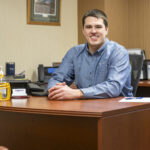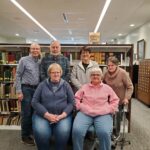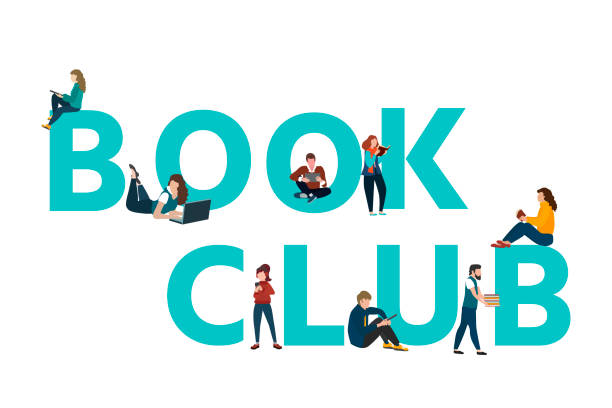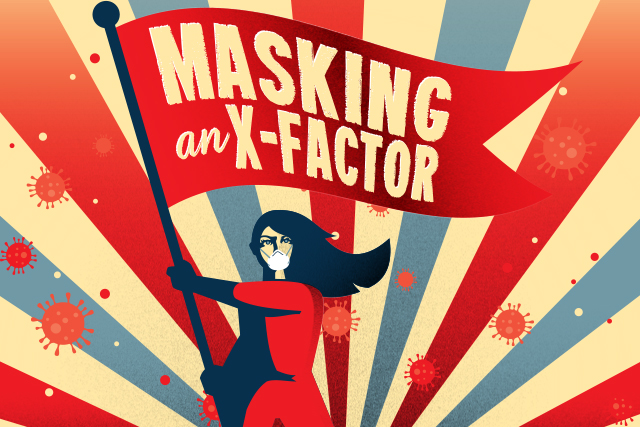

Three years ago in March, on the second day of my new job, a staff meeting discussion turned to how we would operate when the new COVID disease came to South Dakota. I thought it was premature, assuming we had months to prepare. By the end of that week, major sports and other events were being canceled around the country, and as the pandemic settled in, millions would go home to work, if they were able to keep their jobs, 100 million would become sick, and more than a million would die. Even before my staff meeting, a leading player in fighting the pandemic—based in Aberdeen—was already at work.
In January 2020, 3M Aberdeen was already in planning to be in the first line of defense against the newest version of the plague. The Aberdeen plant opened in 1974 and occupies about half a million square feet on 160 acres in northeast Aberdeen. The staff of about 700 people have produced more than 12,000 different products, but they’re best known for N95 respirators.
The local plant was ready to take on COVID because of its unmatched expertise in N95 respirators, “No other 3M facility in the US produces more N95 respirators,” said value stream manager Erik Poe. “In fact, Aberdeen is one of top producers of N95 respirators in the world.” Within a little more than a year, workers at the plant quadrupled their capacity to produce N95 respirators, reaching an unprecedented accomplishment in a time of national need.
X FACTORS
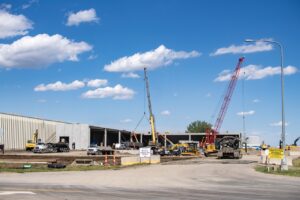
3M Aberdeen is a world-class manufacturing facility that produces 12,000+ products. 3M Aberdeen’s expansion begain in 2020. Photo by Troy McQuillen.
3M calls these major events X Factors, and they include pandemics, forest fires, hurricanes, volcanic eruptions, and other varieties of disaster. “That’s when the 3M community steps up to do what’s needed,” Poe explained. One of the first X Factors 3M Aberdeen addressed was the eruption of Mount St. Helens in Washington state in 1980. It also responded to September 11, 2001, the anthrax attacks that occurred in its wake, and numerous disease outbreaks.
Charged with managing various aspects of N95 respirator production, Poe came to 3M in 2006 with a University of Nebraska degree in mechanical engineering. He started in Aberdeen as a process engineer in the respirator area. After meeting his wife here, they moved to Omaha where she went to graduate school, and he transferred to the 3M facility in Valley, located just outside the city. They returned to Aberdeen in 2017, where he assumed a role that works on capital projects, new product introductions, yield improvement, and process optimization.
While PPP—as the Coronavirus Aid, Relief and Economic Security (CARES) Act’s Paycheck Protection Program—would be symbolic of the Federal response to the pandemic, 3M was already operating with an extra P. Poe said, “We’re not just producing widgets, we’re producing products that protect people—PPPP.” A key example of that is the N95 respirator. Poe notes the difference between N95 respirators and surgical masks or face coverings: Surgical masks and face coverings are for protecting others around you if you are talking or coughing, and an N95 respirator is designed to also help protect the user while breathing in.
Aberdeen makes about 35-40 different types of respirators for several kinds of applications, but the N95 has always been the most produced. It’s also the respirator health care workers use on daily basis. “During the early stages of the pandemic, everything being produced was being sent to front line health care workers. The need quickly outpaced our capacity” Because of that, 3M knew what it had to do.
In spring 2020, across the country and in Aberdeen, schools and many area businesses closed in response to COVID, with some offering pick up services. Those that stayed open often asked customers to wear masks and practice social distancing. Other businesses gradually reopened in later spring and summer.
“3M recognized an unprecedented event,” Poe explained. “We had been through previous pandemics, but this felt a lot different in scale. 3M recognized the global impact from the start.” So they ramped up production already in January 2020, but “We realized they weren’t going to meet the needs of global demand with just our existing equipment, and discussions happened quickly in the beginning stages of COVID.”
EXPANSION
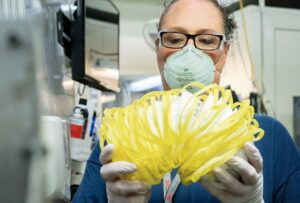
3M Aberdeen employee holding a stack of 3M 8210 N95 respirators. 3M is the largest manufacturer of N95 respirators in the United States. Photo courtesy of 3M.
Word came in early April 2020, that the plant would undergo an expansion in personnel, physical size, and production capacity to respond to the demand produced by the pandemic. Plans were to increase staffing by nearly 50 percent, expand the footprint by 120,000 square feet, and install new, technologically advanced production equipment. All in less than a year.
By April 30, 2020, Aberdeen’s hospitals admitted only one COVID patient, but May brought 13 hospitalizations and two deaths. By the end of 2022, there would be 590 hospitalizations. While hospitals in some cities were nearly overwhelmed by cases, local hospitals held their own. Still, as Avera St. Luke’s communications and public relations coordinator Victoria Lusk explained, “Hospitals across the Avera system did experience a significant increase in hospital admissions of patients with COVID-19. However, we were well prepared and able to operationalize surge plans to continue to meet this unprecedented need of our communities. At Avera St. Luke’s that meant opening up rooms on our previously unused fourth floor and taking other measures such as discontinuing elective surgeries.”
After a relatively gentle 2020 summer, cases, hospitalizations, and deaths began increasing in fall. By the end of 2020, total cases had already reached 40% of the pandemic’s December 31, 2022, total, and the number of deaths was at 45% of that amount.
Regarding staffing, Poe noted, “This plant usually employs between 650-750. During COVID, we peaked around 1000.” And, he added, “It was a significant challenge to hire 300 people.” Besides traditional listings and online postings, they advertised openings in various, perhaps unusual, ways, including postcard mailings and on gas pumps.
To fill the positions, they hired from all over U.S. not just Aberdeen. “Historically we look within a 100-mile radius of the city, but we went wider this time,” Poe noted. Still most hires came from within 100 miles.
That doesn’t count 3M staff who came from other plants to help. Daryl Thoennes, Aberdeen plant manager since June 2022, previously worked at the Hutchinson, Minnesota, plant. “COVID impacted all of 3M,” he said. “Aberdeen did the heavy lifting, but other 3M staff came here,” including from his Hutchinson plant. “It was really a team effort.”
Once the new staff were in place, the experience was like a “whirlwind,” Poe said. “It all happened in short order.” Particularly the physical expansion. That included two phases—basically constructing two new buildings for N95 production. “Everything was done to get the equipment and building ready for production as quickly as possible,” he explained. “We had a huge number of contractors working on it around the clock.” They broke ground for the first building in April 2020 and were producing there in September. Equipment was being installed as the building was being built around it. After the first building was finished, the second was completed just four weeks later.
In fall 2020, most area schools reopened with some masking and social distancing. High school athletics resumed, but area college sports remained sidelined for the fall seasons. During the fall months, the Aberdeen City Council discussed then voted down a mask mandate for the city. By the end of the year, COVID vaccines arrived, and area health care workers received the first doses. Eventually vaccinations were available for all people.
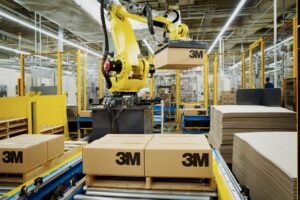
3M Aberdeen robotic arm stacking packed boxes of 3M N95 respirators. 3M Aberdeen produced more than one billion respirators since the beginning of the COVID-19 pandemic. Photo courtesy of 3M.
The third leg of the expansion was the new equipment, and workers had to learn new skill sets. “We were making respirators,” Poe said. “We’re obviously familiar with making respirators, but this was different technology.” In fact, they were some of the most technologically advanced machines for producing respirators in the world. Donnie Johnson, a process engineer in the Aberdeen plant for 18 years, was assigned early on to oversee installation of the new equipment in the expansion. That meant getting the inputs—the raw materials that become N95s—to work with the flat fold respirator production machines. In simplest terms, the machines, Johnson said, “take multiple inputs and convert them to produce N95 respirators.”
The installation was hardly simple, however. Johnson called it “a journey. Everyone was focused on increasing capacity.” Fortunately, they were able to send a core team to other plants to help prepare for installation and debugging. “We were on an aggressive timeline and could meet it because of the chance to learn ahead,” he explained. “It took long hours by a lot of people to make it happen, but we made it happen.” In the end, they added a significant amount of equipment during the expansion.
BILLION-WITH A B
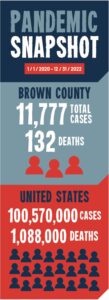
Most impressively, the plant reached 1 billion N95s made during about the first year and a half of the pandemic—from January 2020 to August 2021. For a sense of scale, a package of 20 respirators is about 9 inches tall. One billion N95s in packaging stacked one on top of another would reach over 7,000 miles high—above Earth’s atmosphere. Companywide, 3M produced 95 million N95s per month during COVID, primarily in Aberdeen and Valley, Nebraska.
By the end of August 2021, when 3M reached a billion N95s, Brown County’s cases reached just over 5,800, not quite 50% of what the total would be by the end of 2022. Deaths had reached 95, 72% of the later total. Also, by summer 2021, COVID variants began increasing total cases in the area.
Reflecting on what he saw, Poe referred to what he called the “constancy of purpose” 3M applied to the pandemic. “It’s cool to see what 3M is capable of doing when everyone is working to the same singular goal,” he said. “3M corporate looked to Aberdeen to respond and even sent staff here as needed to meet the goal.” Thoeness agreed, “It was impressive to see how fast things could be accomplished when whole company is working on it.”
“There was a lot of pride in what we were achieving, contributing to the global response,” Johnson said. “A billion respirators is an achievement, something we’re definitely proud of. Setting records after records. It definitely felt like we were part of something big.”
Poe concluded, “For everyone, the #1 priority was getting the lines running. There’s something to be said for people who showed up for work every day during pandemic. When other industries and states shut down, people showed up here because there was a job to do.” And they did it.
X FACTOR LESSONS LEARNED
As noted, 3M has responded to a variety of X Factors. Johnson noted that previous X factors ones caused increased demand that sometimes lasted up six months, “But COVID was a whole bigger scale. Previous X Factors were nothing compared to this.”
Poe agreed. He was in Aberdeen 2009 for H1N1, “the biggest X factor before COVID. We were running all the time, but compared to COVID, it was not even on the same playing field. COVID dwarfs it.”
COVID, which is hardly gone, will not be the last X Factor. “This was unprecedented,” Poe observed. “COVID introduced an entirely new situation with global impact, and it prompted partnerships with the U.S. government to be better prepared for the next thing we don’t want to happen.” He added, “We know we have the capacity in place that we never had before, and we know more, for example, about supply chains and logistical challenges. We are significantly more prepared now than we have ever been.”
Getting there was a difficult and satisfying journey for the people at 3M Aberdeen. Thoeness summed it up, “When I came here, I saw the pride and work ethic here because they really stepped up and helped the world.” //




